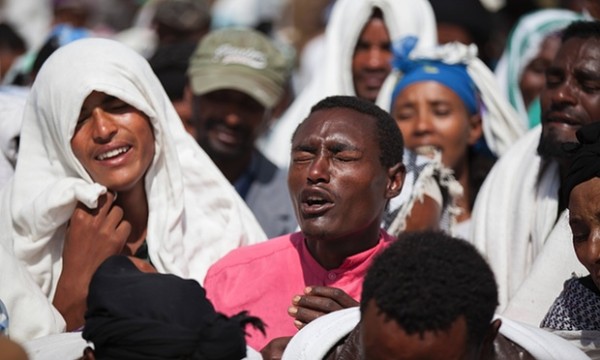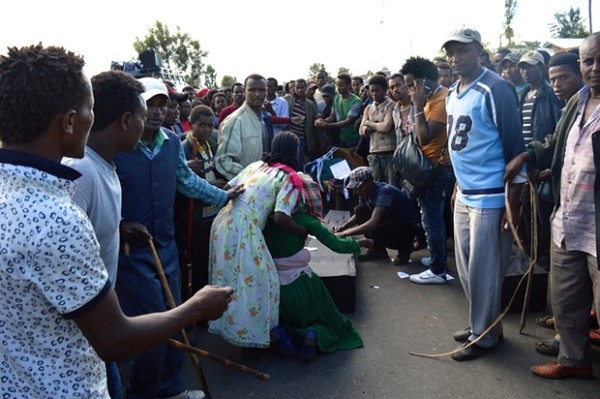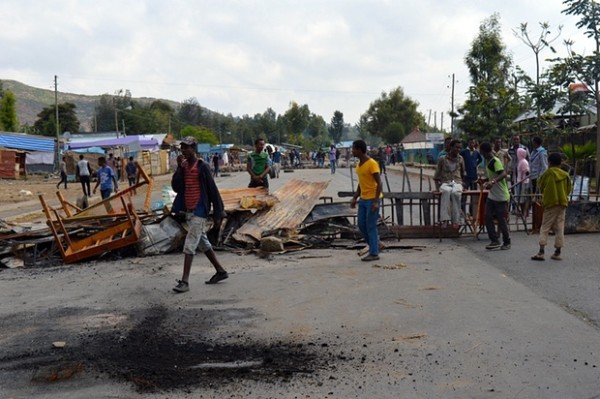PBS: Escaping Eritrea … [Read More...] about ካብ ውሽጢ ቤት ማእሰርታት ኤርትራ
William Davison |
"We don't take sides; we help you see more sides."

Published:
PBS: Escaping Eritrea … [Read More...] about ካብ ውሽጢ ቤት ማእሰርታት ኤርትራ
William Davison |
As government plans to build on Oromo farmland around Addis Ababa spark widespread protests, an increasingly brutal crackdown by the government has sparked fears that excessive force may become the norm
he protesters wrapped the two bodies in blankets and plastic sheeting. On top, they placed pieces of paper with the names of the dead, alongside the bullet casings from the weapons that had just killed them. Then the chanting began: “There is no democracy, there is no justice.”

This was the scene in Wolenkomi, a town in Ethiopia’s Oromia region, on Tuesday, shortly after security forces fired into a crowd protesting at plans to develop farmland surrounding the capital, Addis Ababa. At least four people were killed.
The defiance of protesters from Ethiopia’s largest ethnic group, the Oromo, was recorded by one of the activists, who filmed the scenes with his mobile phone. “Stop the killing!” they shouted.
These deaths are the latest resulting from a wave of protests throughout Oromia over the government’s urban planning strategy, which envisages linking up Addis Ababa with surrounding Oromo towns through an integrated development approach.
Oromia region stretches across Ethiopia and is home to a third of the country’s 95 million people. It has its own language, Afaan Oromo, which is distinct from the official Amharic language.
While multiple witnesses said the Wolenkomi protesters were peaceful before the security forces began shooting, four days earlier a mob ransacked the town administration’s compound and burned the police station.
The government said this week that the recent protests had left at least five people dead, but opposition figures have suggested that more than 50 people were killed in clashes between security forces and protesters, many of whom tend to be students.
The government denies the protesters’ allegations that the urban expansion amounts to a land grab. The communications minister, Getachew Reda, says the plans are intended to ensure that the interests of Oromo are taken into consideration as Addis Ababa grows.
He insists the scheme is about rational development – ensuring that, for example, Addis Ababa road planners know where Oromia state plans to build hospitals – and says there is no possibility that parts of Oromia will be absorbed by the Addis Ababa administration.
Ethiopia is often hailed as a modern development success story. The government has generally maintained order, and has driven growth with an ambitious infrastructure programme. However, its record on freedom of expression and other rights is often criticised by activists.
The demonstrations in Oromia expose tensions between a decentralised system of ethnic federalism and the top-down development approach of an effectively one-party state, which gives people little say in investment decisions.

On the periphery of booming Addis Ababa, the contradiction is acute. As industrial zones, apartments and factories spring up as part of the government’s urban expansion plans, more Oromo farmers will lose their land, say activists.
Sixty-year-old Oromo Desa Geleta is adamant she will not leave the farm where she has always lived in Burayu, on the outskirts of Addis Ababa. As she plucks stray fava beans from the grass, she says that local officials called a meeting three weeks ago to tell residents a housing development would soon be built in the area.
“During the Derg time we died for this land, so we are not going to give it up to anybody,” she said, referring to the military regime, which was overthrown in 1987.
The Derg junta cracked down on the Oromo and other groups in Ethiopia. But the current government has also been accused of abuses – last year, Amnesty International said the authorities had “ruthlessly targeted” and tortured members of the Oromo because of their perceived opposition to the government.
Commenting on the recent protests, the government has described the demonstrators as terrorists and accused them of planning to destabilise the country. Amnesty said this rhetoric would escalate the crackdown against the protesters.
“The suggestion that these Oromo – protesting against a real threat to their livelihoods – are aligned to terrorists will have a chilling effect on freedom of expression for rights activists,” said Lynne Muthoni Wanyeki, Amnesty International’s regional director for east Africa, the Horn and the Great Lakes.
“Instead of condemning the unlawful killings by the security forces, which have seen the deaths of more than 40 people in the last three weeks, this statement in effect authorises excessive use of force against peaceful protesters.”

In an internet cafe in Burayu, Falmata Sena says the planned Addis expansion will be very negative for the Oromo living nearby. “Most of them are farmers, and when you change from agrarian to urbanised, it has its own impact. It will completely diminish the opportunity for Oromo youth. And after the plan is implemented, the language of the area will change from Afaan Oromo to Amharic.”
Falmata would like to see a local development plan that considers the needs and rights of Oromo farmers.
For now, there are few signs that either side is willing to back down. Across Oromia, reports of protests and unrest are still emerging despite the killings. In Ambo, about 50 miles from Wolenkomi, witnesses said two people were shot dead at a demonstration last Saturday.
As darkness fell in Wolenkomi after the killings on Tuesday, the Oromo protesters, who had been jogging round town and chanting defiant slogans, finally began to slip home.
In the quiet of the evening, a group of government workers detailed a litany of grievances against a centralised system they see as overbearing, corrupt and undemocratic.
One guard said he has worked every day since September for an after-tax salary of £19 a month. His office rarely gets the materials it needs as officials pocket the money. Cattle traders tell of a new regulation that requires them to be licensed and pay a fee each time they enter the market. Farmers are angry about a demand for £16 to pay for uniforms for the local defence forces. Corrupt land administration is a recurring theme.
“If a rich person comes and builds a big house, how does it benefit us?” the guard wonders.